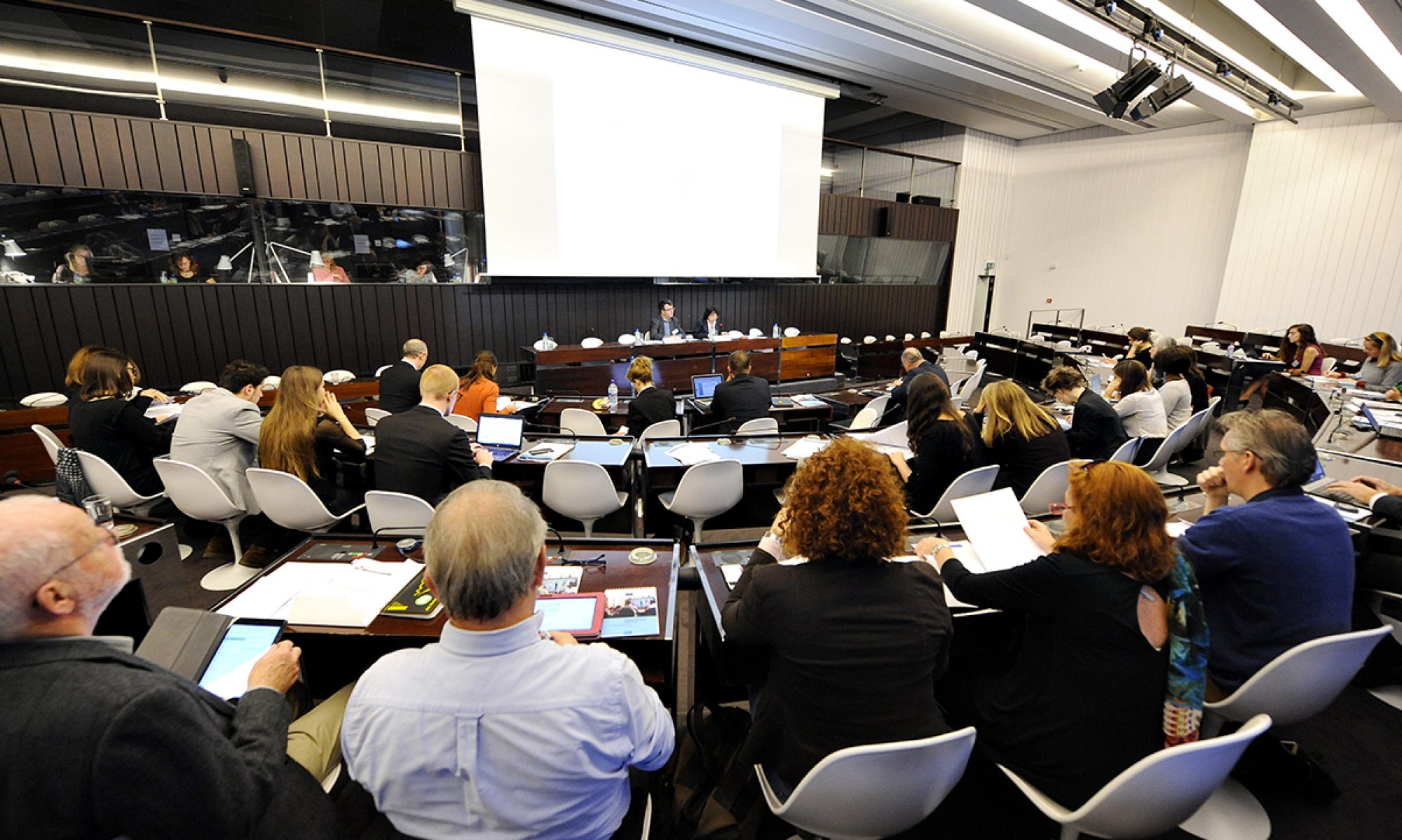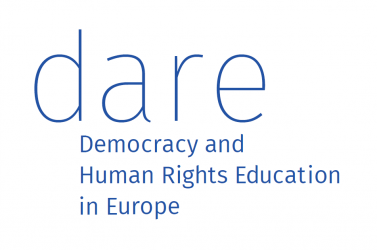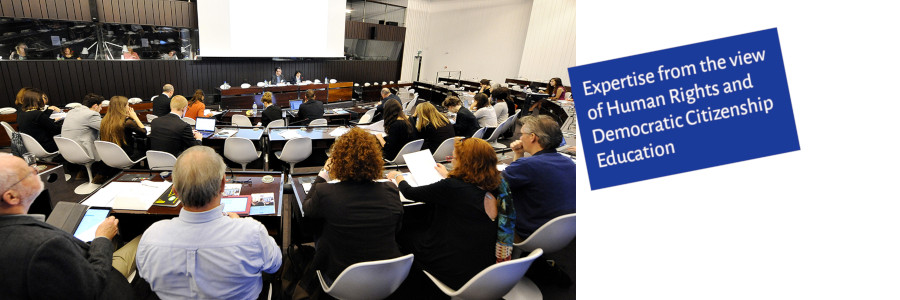- Declaration on promoting citizenship and the common values of freedom, tolerance and non-discrimination through education (Paris Declaration)
- Referred Document: HTML
The Council of Europe Charter on Education for Democratic Citizenship and Human Rights Education summarizes in a precise way the current challenge of Democratic Citizenship Education in Europe. Therefore, educators are „equipping learners with knowledge, skills and understanding and developing their attitudes and behavior, to empower them to exercise and defend their democratic rights and responsibilities in society, to value diversity and to play an active part in democratic life, with a view to the promotion and protection of democracy and the rule of law.“
The Paris declaration of the European Union education ministers from March 17th, 2015 prioritizes the promotion of citizenship and education for democratic citizenship. The 2015 Joint Report of the Council and the Commission on the implementation of the Strategic framework for European cooperation in education and training (ET 2020) “New Priorities for European cooperation in education and training” from December 2015 catch up on these aspects.
The DARE network supports the efforts the EU takes towards strengthening civic values, tackling discrimination and laying the foundation for more inclusive, just and democratic societies. Education and democracy in our societies are the flipsides of one coin. Training civic skills and democratic competences are of an ongoing task and need to constantly be defended and learned. Citizenship education provides spaces for deep social learning and for experiencing and learning how to engage as active democratic citizens. Therefore we endeavor competence based approaches of civic skills and competences learning with an understanding of learning that includes non-formal and formal learning occasions. All educational sectors have to open up, overcome institutional barriers and to gain from each other for more efficiency and quality of education towards these challenges. However to come from lip-services to concrete results is a demanding long-term process that needs lasting commitment to substantially improve the situation.
EDC / HRE and the Paris Process: Policy dimensions
The Process following the Paris declaration 2015 can be a landmark for Citizenship Education in the EU as it has the potential to bring back the importance of Education for Democratic Citizenship on the agenda of the EU and its member states, if followed properly. However we want to remind that the declaration needs to be read in a coherent line with other instruments that affect Citizenship Education in Europe, namely
- The Council of Europe Charter on Education for Democratic Citizenship and Human Rights,
- The European Charter on Fundamental Rights
- The Childrens Rights Convention,
- The UN SDG 2030 (Article 4.7 and 4.8),
- The EU programs related to the ET 2020 and the European Youth strategy but also to the European action plan on HR need to be mentioned especially, as they create the conditions for citizenship educational work in (and outside) the Union.
- The Recommendation 2006/962/EC of the European Parliament and of the Council of 18 December 2006 on key competences for lifelong learning
All of them provide legal frames and instruments and mark the importance to allocate sound means for Citizenship Education and Human Rights Education. They call the EU, the COE and the member states to create and conduct policies accordingly in order to provide and develop the societal conditions and the learning opportunities to embrace living in diversity and democracy for all people in Europe.
The brutal terrorist attacks in 2015/2016 are an ongoing vital threat to our on freedom and solidarity based model of societies. They challenge and disturb the model of open societies as they bring in fear and mistrust and may lead to prioritize security issues towards other societal relevant fields.
We should be aware that the long fought for liberties, freedom, pluralism and diversity in democratic societies are in several spheres and member states in the EU and beyond at risk also from another angle:
The discussions that have emerged around Asylum, Refugees and Fundamental Right in Europe throughout the last year brought up almost antagonistic views and ideas what the EU and Europe stand for.
The raise of national-populist parties and movements and the emerging of right-wing mindsets in the middle of societies, the growth of illiberal democracies and the raising support for authoritarian rule in European states are an alarming signal that democracy in our societies is highly at risk and needs to be defended and fought for.
Democracy needs deliberating
Such the EU has a significant responsibility and is asked to commit actively and stand to it wherever needed. Democracy needs deliberating. Deliberating means to fight for the universal validity and application of human rights, dignity and solidarity within a democratic civic (and political) culture. Europe-wide we are confronted with the rise of a undemocratic and exclusive concepts of citizenship, of politicians and people who claim to speak on behalf of “the regular people”, „the established”, claiming “human rights first for us, not for the others!”, threats driven by people who promote easy solutions in the frame of the national state and claiming to act preserving the interest of the nations and national states.
This is a vital threat for living together and has the potential to bring societies in Europe as a whole and in each member state individually into heavy trouble. Any Education for Democratic Citizenship is called to take a stand against the promotion of such concepts and has to clearly formulate a position from a democracy and human rights based educational perspective. Education for Democracy and Human Rights is an important backbone of society as they help to unleash the conflicts in societies, question power relation in order to contribute to societal change with a positive vision of living together. Education for Democratic Citizenship in the EU and the member states must follow democratic principles and build on the attitude of inclusiveness as formulated also in the above mentioned basic documents of UN, COE and EU – they are more than ever relevant.
Inclusiveness: all people living in Europe should benefit
All people living in Europe must get the opportunity to benefit from the measures that are undertaken by the EU. The benefit is not primarily bound to the formal Union citizenship, but needs to be understood as a challenge for the whole society. Therefore we see a specific address to concrete „risk and excluded groups“ as formulated in the Paris declaration as difficult: Societal exclusion itself can be the result of a discriminative policy that conflicts with the inclusive spirit of Human Rights and democracy as confirmed by the Paris declaration of the ministers.
Such we propose that any measures and programs have to be inclusively designed in order to prevent stigmatization of specific groups within the European society as groups with a specific democratic deficit.
Transforming spaces for learning and experiencing democratic citizenship
Democracy is a public good. Democracy learning needs democratic learning environments and structures. Thus states share the responsibility to provide support for sound education and youth work as the core dimensions for democracy learning of young people and adults. Starting from early childhood schools, non-formal educational providers, adult learning offer places and spaces of a significant importance in the field of democracy learning and learn about democratic interaction.
Gaining civic competence means to learn and experience trust in society, to experience self-efficacy, to get the opportunity for the experimentation of self-responsibility and the capacity for independent action. This can be perceived better in learning environments that go beyond the classrooms. Therefore the DARE network asks for a broader understanding of learning spaces.
Such spaces are all those where
- learning opportunities exist, where learners experience democratic self-efficacy
- The values of Democratic Citizenship Education are practiced and learning on eye-level is promoted
- The individual is respected and a resource-oriented perspective is guiding the pedagogical process in contrast to a deficit-orientated perception of the individual capacities (such as promoted by any approaches that target on “disadvantaged”, “social excluded” etc.)
- discussion and empathy towards other opinions and backgrounds is welcomed and trained in a discursive and diversity embracing way
- civil courage and an „active stand against all forms of discrimination and racism“ are enshrined and trained, same as mentioned in the Paris declaration.
The European Institutions and member states should envisage to give every child and student the opportunity to at least once in school time experience democratic learning in democratic learning spaces!
Empowering Educators and educational institutions
The DARE network supports the educational ministers’ approach of „fostering the education of [disadvantaged] children and young people, by ensuring that our education and training systems address their needs“. All educational institutions and their pedagogues/ educators have a decisive role here. They are responsible for the design and the implementation of any learning processes and need to be adequately supported by all policy making levels.
While the Paris declaration mentions only teachers, we want to argue for an understanding that puts all people and institutions in focus, that have a say to the democratic learning of young people:
Formal education
School heads, teachers, school councils, class councils are the instruments to contribute to a democratic development of school, thus resulting in the development of democratic learning environments, where children feel their say respected. Teachers need to be supported, trained and equipped adequately with the relevant skills. It needs to be acknowledged that teachers have time budgeted to accordingly attend further training and network with the actors outside the school system (community networks, non-formal education providers, et al) in regard to create holistic learning conditions for citizenship. To name as examples children rights school development processes and HR schools, that exist already in some countries. Their experiences need to be reflected, reviewed and broadly applied in Europe. Curricula development needs to reflect on the issue that democracy is not bound to a specific lessons and topics, but a democratic approach applies to all school subjects and mainly to the whole understanding of school as democratic body.
We do not need to reinvent the wheel, but can build on existing foundations: Educational ministries can improve the situation substantially by providing systematic access to the resources developed in the frame of the Council of Europe on democratic school development and include the preparation of teacher and school staff already in their qualifying phase during university.
Citizenship Education is a topic that goes far beyond the class room and single learning units. Its success cannot be measured in marks, but on the long run results in the formation of a stronger democratic society. Therefore teachers need to be trained and supported to develop other forms of evaluation and assessment regards to development of social and civic competences.
Especially primary schools need to be understood as democratic learning spaces where democracy learning is core of the institution. It needs to be acknowledged that democracy learning is at the heart of any school systems and needs to become of the same importance as MINT related learning.
Non-formal education
Non-formal education comprises pedagogues, trainers and institutional providers of non-formal education. The European Youth Strategy as a core instrument in the EAT 2020 and EU 2020 underlines the importance of non-formal educational spaces for the development of democratic and social competences among young people.
The COE Charta on EDC/HRE clearly lines out that youth organizations, providers of youth work and non-formal education have the competency to equip learners with democratic skills.
Staff and providers should be supported accordingly by the state levels. In most European countries an understanding of citizenship educational infrastructure as integral and transformative part of youth (and) adult work lacks. Still in 2016 Citizenship Education is in most states highly depending on European projects funding, while an understanding of a holistic socio-pedagogical field of Citizenship education in Youth work with the according support and infrastructural dimension in most European member states does not exist. Such a successful prevention infrastructure and instrument that vitally and holistically can contribute to the formation of democratic societies lacks in most European countries.
Youth work, youth educational workers as well as the people that work on social competences development with young people are key to democracy learning, thus the state levels are asked to commit themselves support their non-formal educational work with adequate and sufficient means on an infrastructural basis.
The EU should stimulate the conditions and ask for this responsibility wherever possible (EU youth report, policy programming and program monitoring). More than ever the EU is asked to set out clear perspectives and procedures for failing these commitments, this also includes a clear monitoring of funding.
An independent body to support quality Citizenship Education in Europe: A European Agency for Citizenship Education
Even 25 years after the fall of the iron curtain Democracy in Europe on all levels cannot be taken for granted. Democracy relies on constant exercise, training, discussion, practicing and challenging of ideas about the common future in our societies. As such our democracies need to inherently build on democracy learning, thus giving people the chance to experience democratic interaction and self-efficacy. All people in Europe should be given this chance.
Independently from European policy programs and projects we see a need to institutionalize a mechanism to provide support at a large scale to Democratic Citizenship Education in Youth and Adult learning in Europe.
We suggest to the European Parliament and to the Council of Europe to set up a European Agency for Citizenship Education, which can act independent from national policies and party policy programs and should be democratically controlled by the European Parliament and the Council of Europe.
The mandate of the agency would be
- to provide accessible educational resources (handbooks, studies, textbooks, materials etc) for teachers,
- supporting trainings and offering funding mechanisms for accredited providers of Citizenship Education in youth and adult learning,
- creating spaces and opportunities for a professional exchange and training of educators by delivering own incentive projects
Thus the EU can vitally advance the situation in most of the member states and add incentives in the most relevant dimensions of Citizenship Education in Europe in all learning contexts on a broad scale, namely:
- Embracing diversity and fundamental freedoms in all aspects of societal life
- Preventing from radicalization and working out strong democratic competences
- Preventing discrimination in pluralist societies
- Learning from history and deducting responsibility for the future
Acknowledging the infrastructural dimension of non-formal education
Civic engaging for democracy manifests itself in educational NGO work. Therefore non-formal educational work is to be understood a basic infrastructure for democratic societies. Providing independent learning opportunities accordingly needs to be supported by the states levels as well as by the EU. The EU and the member states should acknowledge that a pluralist democratic society which builds on diversity and a positive vision of living together in a democracy are rooted in a functioning and self-organized pluralist civil society which is able to define democratic learning from the ground. Such they should foster the crucial role of independent providers of democracy learning. Currently a lot of states fail this obligation, or positively formulated: they are not alone when it is about improving the conditions. According to the EU Youth strategy, the COE Charter on EDC/HRE all governmental levels have a responsibility to soundly support the work of independent educational systems and actors that act according to the values, priorities and standards of EDC.
The EU is asked to support the development of a coherent education for democratic citizenship policy that contributes to the development and further formation of democratic learning spaces on the ground. As such the EU is asked to ensure democracy education becomes a core dimension starting from the local educational facilities and youth work structures and complementary programs and support from the states and local levels are provided.
The EU is asked to include the transformation of democratic learning spaces as defined in the EU youth strategy which asks to realize the full potential of youth work and youth centres as a means of inclusion: One role-model can be the German model of education centres for democratic citizenship for young people, which are backbone of citizenship educational policies in the German context. Adequate infrastructure accordingly has a key role for democratic learning and needs to be supported by the states and the EU. As such EU funding should also result in supporting the establishment of de-central and independent places for non-formal citizenship education, youth encounter and civic engagement
Why DARE?
DARE – Democracy and Human Rights Education in Europe is an independent network of providers of citizenship education and human rights education devoted to raise the profile of Education for Democratic Citizenship (EDC) and Human Rights Education (HRE), promote transcultural and transnational cooperation, and enhance the quality of education within these fields.
Established in 2002, the DARE network is registered under Belgian NPO law (Ordenemingsnummer: 480.114.168) as a non- profit organization (vereniging zonder winstoogmerk) and has its legal seat in Belgium.
DARE aims at achieving recognition, visibilitity and adequate resources for EDC and HRE as a core obligation for the formal and non-formal education systems throughout Europe.
DARE has been established to address three shortcomings in the present arrangements for NGOs in Europe carrying out invaluable work in EDC and HRE:
- The prevalence of NGOs which tend to work without adequate resources and in isolation, and are therefore inhibited in their access to information, to potential European partners, and to effective lobbying.
- The tendency to treat separately the distinct but nonetheless closely interrelated fields of HRE and EDC.
- The distance between research and practice, academia and activists, political scientists and educators in EDC/HRE
More information on DARE´s activities: www.dare-network.eu


